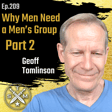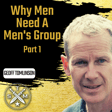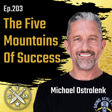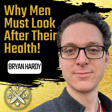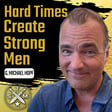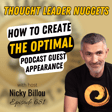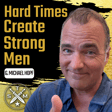
EP193: Sachin Patel - The Power Of Breath
“Between the stimulus and response, there is a breath and in that breath is our power to choose our response.”
Most men are trying to outlift their stress, out-supplement their fatigue, and outrun their burnout. But breath—the one thing we can’t live without for more than a few minutes—is usually ignored. This episode explores how breath influences every system in the body, from mitochondrial function and hormone production to posture, sleep, and even jaw development. Proper breathing isn’t just a wellness hack—it’s foundational to vitality, energy, and emotional resilience.
Our guest breaks down how unconscious mouth breathing affects testosterone levels, focus, and sleep quality, and how slow, nasal breathing can rapidly shift a man out of fight-or-flight mode. He shares practical techniques, including coherence breathing, diaphragmatic exercises, and mouth taping, to help men reclaim calm, clarity, and confidence—without needing another supplement. The results? Better sex, sharper thinking, and even a more defined jawline.
Dr. Sachin Patel is a chiropractor, functional medicine practitioner, breathwork facilitator, and the founder of the Living Proof Institute. With thousands of guided sessions under his belt, he teaches people how to optimize their health through the forgotten power of breath. His work blends ancient wisdom with modern science to help people live longer, perform better, and feel deeply aligned.
Learn more & connect:
Get instant access to Sachin’s most requested trainings on breathing and breathwork.
Also in this episode:
Books:
- Be Here Now by Ram Dass
- Tiny Habits by B.J. Fogg
- Breath by James Nestor
You’re invited to come to a Sovereign Circle meeting to experience it for yourself. To learn more, go to https://www.sovereignman.ca/. While you’re there, check out the Battle Ready program and check out the store for Sovereign Man t-shirts, hats, and books.




